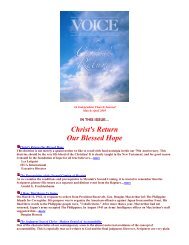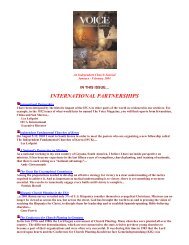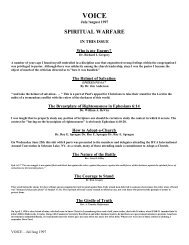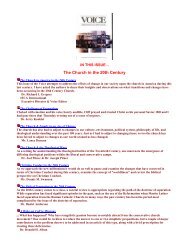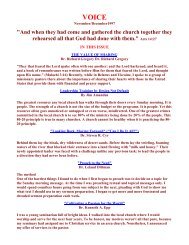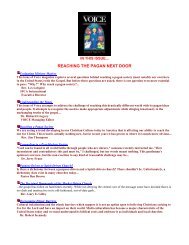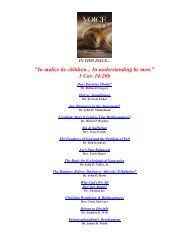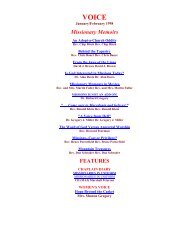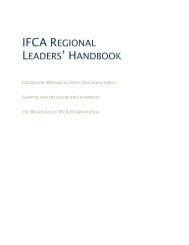URGENCY OF THE HOUR - IFCA International
URGENCY OF THE HOUR - IFCA International
URGENCY OF THE HOUR - IFCA International
Create successful ePaper yourself
Turn your PDF publications into a flip-book with our unique Google optimized e-Paper software.
communication of information. To be effective, a sound theology must also be a demonstrable theology.<br />
Robert Calvin Guy has written,<br />
"The basic question about an adequate theology of mission is, does it help mediate the redeeming<br />
presence of Christ to the hearer or reader? Does it get him involved with God personally and<br />
redemptively? Without this redemptive involvement the very purposes of God are thwarted, and no<br />
amount of theology, however skillfully stated, can make up for that loss…Theology must stand the test of<br />
being known by its fruit…Theology must drive those who hold it into redemptive activity." (2)<br />
The Apostle Paul said regarding his ministry among the Thessalonians, "…we were gentle among you,<br />
just as a nursing mother cherishes her own children. So, affectionately longing for you, we were well<br />
pleased to impart to you not only the gospel of God, but also our own lives, because you had become<br />
dear to us" (1 Thessalonians 2:7,8 emphasis added). Sound doctrine and sound living must be parallel<br />
proclaimants of the gospel message.<br />
A word of concern and caution is warranted as we discuss this important subject of the theology of<br />
mission. In relatively recent years there has been a trend in mission of placing an emphasis on<br />
cultural/redemptive analogies, often at the expense of theology. While having perhaps some practical<br />
illustrative benefit, such cultural corollaries must never eclipse the application of sound exegetical<br />
theology. Despite the fact that many cultures around the earth have ancient stories and customs that<br />
seem to mirror the biblical record, such practices and related legends should not be assumed to be<br />
redemptive. Similarity does not imply sameness, somehow on a par with biblical revelation.<br />
In Acts 17, for example, the apostle Paul, while awaiting the arrival of Silas and Timothy, was provoked<br />
in his spirit as he saw that the city was given over to idols. Paul acknowledged that they were "very<br />
religious," and even acknowledged a compatible teaching from "some of your own poets," however<br />
Paul's response was not one of acceptance and syncretistic accommodation, but declaration of truth and<br />
clarity of the doctrine of the gospel. The text is clear that Paul, "preached to them Jesus and the<br />
resurrection (17:18)."<br />
A careful reading of Acts 14 and 17, along with other portions of Acts, demonstrates that the Pauline<br />
missiological methodology was governed by sound exegetical doctrine. While some in our day would<br />
have been thrilled at such a welcome as that initially experienced in Lystra, not so with Barnabas and<br />
Paul. On the contrary Barnabas and Paul "tore their clothes" and immediately articulated corrective<br />
doctrinal truth regarding the true nature God, though having their message cut short, beaten and dragged<br />
out of the city and left for dead, they returned the next day to "preach the gospel" in the cities of Derbe,<br />
Lystra, Iconium and Antioch (see Acts 14:8-23).<br />
Though the book of Acts records the methodology of mission, even there it can be demonstrated that<br />
theological truth is at the heart of mission. Paul's missionary pattern was consistently the same. Having<br />
been sent out by the Holy Spirit from the context of the local church at Antioch, at the very first stop,<br />
"when they arrived in Salamis, they "preached the word of God…" Acts 13:5 (emphasis added). This is<br />
the common commitment throughout this missionary manual known as the book of Acts. (See Acts<br />
4:31; 6:2,7; 8:4,14; 11:1; 12:24; 13:5,7, 44,46; 17:13; 18:11.)<br />
It is also important, I believe, to establish the priority of a proper ecclesiology in order for a proper<br />
missiology to be achieved. Missiology must be driven by ecclesiology, and not the other way around. In<br />
practical terms, mission agencies are not replacements for the local church, but can serve as a practical<br />
outgrowth of the mission of the Church. I appreciate what John Fish has written,<br />
"What the church is determines what the church does. Further, the structure of the local church is<br />
determined by the nature of the church. Thus, the practical matters of structure and functions of the<br />
local church are determined not by pragmatism, what may happen to be effective for a particular<br />
community, but by theology, what the church is by nature. The descriptive portions of Scripture which<br />
present the organization and practice of the church in the New Testament need to be correlated with the<br />
doctrinal sections which present the character of the church itself." (3)



